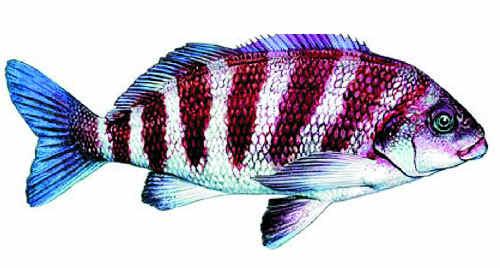Global warming affecting fish
AUSTRALIAN scientists have reported the first known detrimental impact of southern hemisphere ocean warming on a fish species.

Central Queensland
Don't miss out on the headlines from Central Queensland. Followed categories will be added to My News.
AUSTRALIAN scientists have reported the first known detrimental impact of southern hemisphere ocean warming on a fish species.
The findings of a study published in Nature Climate Change indicate negative effects on the growth of a long-lived south-east Australian and New Zealand inshore species, banded morwong. (Cheilodactylus spectabilis).
The bony structures fish use for orientation and detection of movement – called otoliths – have annual growth rings which were measured for changes.
Similar to growth rings in trees, they can be counted to indicate a fish’s age and annual growth rate, estimated by measuring distances between each new ring.
Co-author of the paper, University of Tasmania (UTas) researcher Jeremy Lyle said banded morwong were used in the study because they can live for almost 100 years and, as adults, they stay in essentially the same area even if the water temperature shifts.
“Growth rates of young adult banded morwong in south eastern Australia have increased significantly since 1910 at four sample sites,” Dr Lyle said.
“The team compared these changes to temperature trends across the species’ distribution.
Dr Lyle said the study showed that growth performance in banded morwong began to suffer above average annual water temperatures of about 17 degrees.
“Generally, cold-blooded animals respond to warming conditions by increasing growth rates as temperatures rise,” marine ecologist Dr Ron Thresher said.
“But theory and laboratory studies show that this has a limit.
“As temperatures get too high, we begin to see increased signs of stress, possibly leading to death.
“We are looking at whether climate change is beginning to push fish past their physiological limits.
“By examining growth across a range that species inhabit, we found evidence of both slowing growth and increased physiological stress as higher temperatures impose a higher metabolic cost on fish at the warm edge of the range."
Scientific monitoring since 1944 by CSIRO at Maria Island, off Tasmania, showed that surface water temperatures in the Tasman Sea have risen by nearly two degrees in the past 60 years.
This rapid warming, in southern hemisphere oceans, is due to globally increasing sea-surface temperatures and local effects caused by southward extension of the East Australian Current.
Dr Thresher said climate change can affect species directly by influencing how their bodies function, their growth and behaviour and indirectly through environmental effects on ecosystems.
Originally published as Global warming affecting fish


